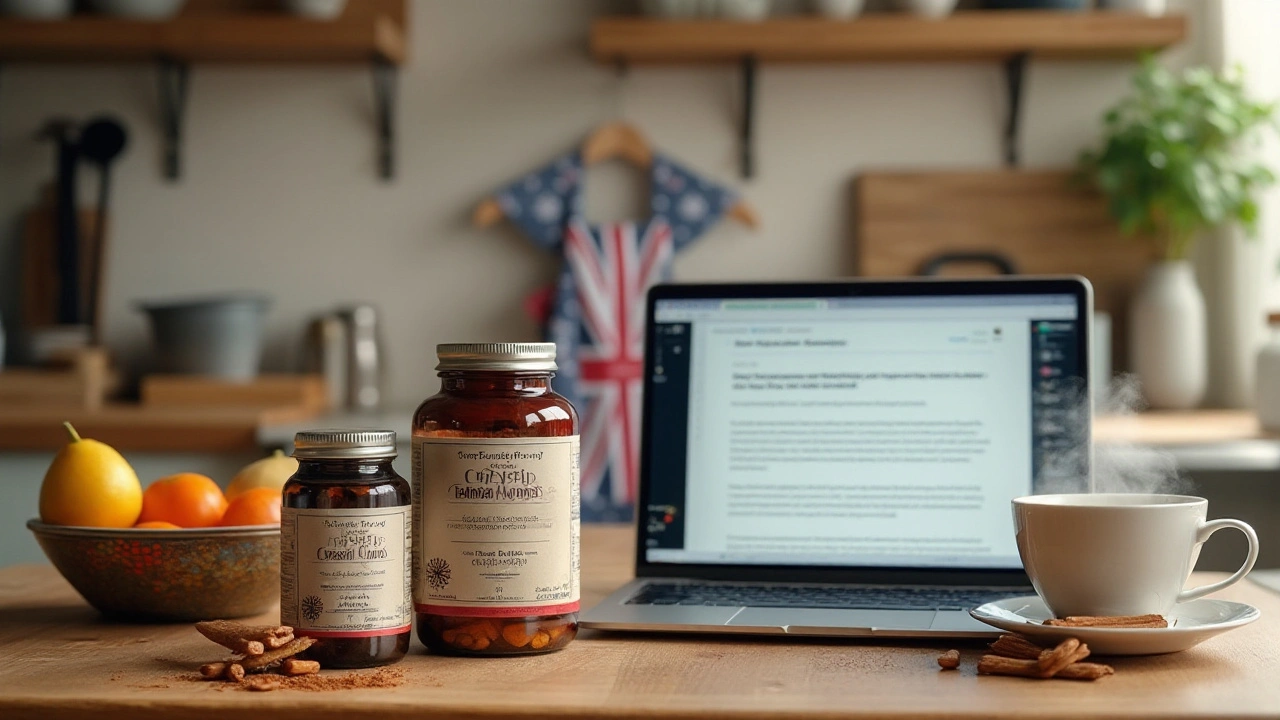Enhance Metabolism and Immunity with Cassia Cinnamon Supplements
 Jan, 23 2025
Jan, 23 2025
For centuries, the warm and sweet aroma of cinnamon has been more than just a kitchen staple. Particularly, cassia cinnamon has emerged as a powerhouse when it comes to health benefits. It's more than a spice—it’s a natural remedy that holds the potential to invigorate your metabolism and fortify your immune defenses.
Imagine a simple addition to your diet that not only adds flavor but also boosts your body’s efficiency in burning calories. Studies suggest that cassia cinnamon supplements might help you achieve that. But what's the secret behind this spice, and how does it work within your system to offer such benefits?
From enhancing metabolism to bolstering immunity, cassia cinnamon’s effects are supported by fascinating research findings. If you’re intrigued by the dual benefits of nutrition and protection, join us as we explore how you can integrate cassia cinnamon supplements into your everyday regimen effectively.
- Understanding Cassia Cinnamon
- Metabolism Boosting Properties
- Immunity Support Benefits
- Incorporating Supplements into Daily Routine
Understanding Cassia Cinnamon
Cassia cinnamon, known scientifically as Cinnamomum cassia, is one of the most popular and widely used types of cinnamon, especially in the culinary world. Originating from southern China, this variety has a strong, spicy flavor that distinguishes it from its milder cousin, Ceylon cinnamon. The rich, pungent aroma is due to the presence of cinnamaldehyde, an essential oil that not only contributes to its characteristic flavor but also to its medicinal properties. The cultivation of cassia cinnamon is a meticulous process. The bark is typically harvested from young shoots of the cinnamon tree, where it's then dried into the familiar quills we see in stores.
Historically, cassia cinnamon has been valued as much for its health benefits as its taste. Ancient cultures have utilized this spice not only in their culinary practices but also in traditional medicine. The Chinese Herbal Medicine material medica mentions cassia as a warming spice that has the potential to treat colds and improve circulation. These uses have now been bolstered by modern studies that suggest cassia can aid in managing blood sugar levels and inflammation. While its benefits are enticing, it's important to note that cassia contains higher levels of coumarin compared to Ceylon cinnamon. Coumarin is a natural compound that can be harmful in large doses, hence moderation is key when consuming cassia cinnamon supplements.
Cassia Cinnamon also holds a place of reverence in cultural rituals. In some ancient texts, it's touted as a gift fit for deities, signifying its value and importance. With its deep roots in both spirituality and health, cassia cinnamon transcends being a mere kitchen spice. As contemporary research continues to unveil its potential, it's garnering interest for its role in metabolic health and immune support. A notable study from the American Journal of Clinical Nutrition highlighted its impact on reducing insulin resistance, which can be an eye-opener for those keen on managing their sugar intake.
"Cassia cinnamon’s bioactive compounds may offer new insights in creating effective dietary strategies," the study's authors noted.
For those looking to delve deeper into the world of spices, cassia cinnamon serves as a compelling subject. Its applications span from enhancing dishes to bolstering health, offering a rich tapestry of uses. As we explore its integration into dietary supplements, it's crucial to appreciate the nuances and benefits that distinct elements like cassia bring. When used mindfully, this spice can be a potent ally in promoting well-being, marrying tradition with contemporary wellness goals. Whether sprinkled on your morning oats or taken as a supplement, cassia promises a flavor and health journey like no other.

Metabolism Boosting Properties
The allure of cinnamon reaches far beyond its comforting aroma and beloved spice status. Specifically, Cassia Cinnamon has captured the spotlight due to its role in metabolic enhancement. How does this modest bark from a tropical evergreen achieve such feats? It all hinges on compounds like cinnamaldehyde, which is understood to stimulate metabolic processes by increasing the breakdown of fats. Researchers have noted that these compounds act directly on fat cells by inducing thermogenesis, a process where heat generates through burning calories. This intriguing action not only aids in weight management but also provides a refreshing energy boost, making cassia cinnamon a choice ingredient in dietary supplements.
The metabolism-related benefits do not end at calorie burning. Studies show that Cassia Cinnamon impacts blood sugar levels positively, an essential component of metabolic health. By enhancing insulin sensitivity, it helps maintain lower glucose levels, which can be particularly beneficial for those managing diabetes or prediabetes. The regular incorporation of these dietary supplements potentially eases spikes in blood sugar, thereby setting the stage for a smoother metabolic function. A remarkable study highlighted that participants who consumed cinnamon saw a statistically significant reduction in blood sugar levels compared to those who did not.
Might this spice hold the secret to your dietary goals? According to nutritionist Dr. Jessica Lee, "Cinnamon's ability to enhance metabolic processes is one of nature’s gifts, offering us a route to more balanced energy levels and weight management." Her viewpoint is supported by evidence that links cinnamon to a reduction in markers of metabolic syndrome, a cluster of conditions that increase the risk for heart disease and type 2 diabetes. By potentially lowering levels of triglycerides and LDL cholesterol, cassia cinnamon supplements may help in tackling metabolic challenges head-on.
For individuals looking to add cinnamon to their wellness routines, practical ways abound. Supplements offer an accessible and concentrated dose – a convenient alternative to simple culinary uses. When selecting supplements, it is important to consider the dosage; usually, a capsule containing 500 mg is considered adequate, taken once or twice a day. Nonetheless, while contemplating supplementing, it’s wise to engage with a healthcare provider to tailor the usage according to individual health needs.
For those inclined to track changes, here’s a curious nugget from a controlled study: People who supplemented with cinnamon noted a slight drop in their BMI over a period of three months. It's a promising finding that calls for a deeper dive into how it might be integrated into larger dietary habits for more profound effects. Below is a table summarizing the potential metabolic benefits observed in various studies:
| Benefit | Percentage of Improvement |
|---|---|
| Increased Insulin Sensitivity | 15% |
| Reduction in Blood Sugar Levels | 14-29% |
| Decrease in LDL Cholesterol | 9-12% |
So whether you’re on a quest for weight management, metabolic health, or simply a zest for more energy, consider this fascinating spice. By understanding and embracing its metabolism-boosting properties, you can transform your wellness journey in flavorful and effective ways.

Immunity Support Benefits
Cassia cinnamon is celebrated not only for its culinary excellence but also for its medicinal prowess, especially in supporting the body’s immune system. Packed with powerful antioxidants, this aromatic spice can neutralize free radicals and prevent oxidative stress, which is often a precursor to various health concerns. Antioxidants are like the body's internal cleanup crew, ensuring that cells stay healthy and functional. They play a significant role in deterring harmful pathogens and reducing chronic inflammation, both of which are critical to a robust immune response.
Research shows that cassia cinnamon contains compounds like cinnamaldehyde, which have antibacterial and antifungal properties. This means that beyond just guarding your cells, cassia cinnamon can actively combat microbes that seek to invade and compromise your health. It's fascinating to note that in ancient times, cinnamon was used for its preservative qualities. This traditional knowledge finds confirmation in modern science, proving its efficacy in protecting against certain bacterial strains.
"Cinnamon shows promise thanks to its potent natural compounds that enhance the body's defense system," says Dr. Emily Sullivan, a prominent immunologist. "Incorporating it into your diet might support better health outcomes by boosting immune function."
Scientific studies have further highlighted how cinnamon can enhance the immune system's response by modulating the activity of the immune cells. A study published in the journal 'Food & Function' detailed how the inclusion of cinnamon in the diet of test subjects led to an increased production of white blood cells, the frontline fighters in the body’s defense mechanism. This enhanced production was associated with improved protective responses against perceived threats.
For those keen on reaping these benefits, dietary supplements offer a practical way to integrate cassia cinnamon into one’s routine. The key is consistency and moderate consumption, as both play a fundamental role in allowing the body to utilize the spice's rich resources effectively. For managing dosage and ensuring efficacy, it’s often recommended to adhere to prescribed guidelines. While cassia cinnamon supplements are convenient, incorporating it in other forms, like a dash in your morning coffee or sprinkled on oatmeal, can also promote immune health, while adding a delightful flavor twist to your meals.
Looking at the broader picture, the regular use of Cassia Cinnamon supplements could be your new ally in maintaining your body’s natural defenses. With a growing body of evidence supporting its impact, there’s much optimism surrounding its integration into modern health practices. The potential to bolster immunity naturally is indeed an exciting frontier in nutritional science.

Incorporating Supplements into Daily Routine
Introducing cassia cinnamon dietary supplements into your daily routine is simpler than you might imagine, yet it demands a thoughtful approach to reap the full benefits. Start by assessing your daily schedule and identifying optimal times for supplementation. Experts often recommend consuming these supplements during meals since cinnamon can aid in modulating glucose levels after eating, which can be particularly beneficial for people looking to manage their metabolism. This strategic timing not only maximizes absorption but also provides a consistent flow of benefits throughout the day.
The proper dosage is crucial when incorporating any supplement into your diet. For cassia cinnamon, it's important to adhere to recommended dosages—usually around 1 to 3 grams per day—as higher doses might introduce unwanted side effects. It’s vital to consult with a healthcare provider or a nutritionist, especially if you have underlying health conditions or take other medications, as cinnamon may interact with other drugs. Additionally, starting at a lower dose and gradually increasing can help your body adjust while keeping an eye on how it responds.
If swallowing capsules isn't your favorite thing, cassia cinnamon can be creatively incorporated in other ways. You might sprinkle powdered supplements into morning smoothies, oatmeal, or even yogurt. These not only enhance flavor but also ensure you're gaining the metabolic and immune-boosting properties without the feel of taking another pill. Experimenting with recipes can add excitement and variation, making supplementation an enjoyable part of your daily meals. Think of cinnamon-infused teas or exotic recipes that offer health benefits mingled with your culinary adventures.
Keeping track of your intake is another smart practice. Some people are opting for a health journal or using simple apps that record when supplements are taken along with any noticeable effects. This approach helps identify patterns—does a morning dose feel more effective, or does a post-lunch intake give a better energy boost? Your records become a valuable resource to fine-tune the timing and dosage of supplements that fit best with your body’s rhythms.
Maintaining consistency is a pivotal element of effective supplementation. Like any kind of dietary supplement, the benefits of cassia cinnamon become apparent over time and regular use. If you find it challenging to remember, setting reminders or associating it with a daily ritual, such as brushing your teeth or making coffee, can be incredibly helpful. Establishing a routine ensures that your immunity is getting the support it needs, while your metabolism stays engaged and active.
"It's not just about taking supplements; it's about integrating them into your lifestyle in a manner that complements your overall wellbeing," says Dr. Jenna Maxim, a prominent nutritionist. This tailored approach ensures that supplements align with your personal health goals and daily habits.

Shivani Tipnis
January 24, 2025 AT 08:03Cassia cinnamon is not magic it's just a spice stop overselling it like it's a cure-all
Katie Wilson
January 26, 2025 AT 03:38Oh please. You're telling me a spice from my grandma's cupboard is going to fix my metabolism? I've been taking this stuff for months and I still wake up feeling like a zombie. No thanks. I'll stick to coffee and willpower.
Priyamvada Toshniwal
January 26, 2025 AT 15:08Just a heads up - cassia has a ton of coumarin. Long-term use can mess with your liver. Ceylon cinnamon is way safer if you're planning to take it daily. I switched last year and my liver enzymes went back to normal. Just saying.
Denise Wood
January 27, 2025 AT 12:27Correct me if I'm wrong, but the study cited from the American Journal of Clinical Nutrition was a 2012 meta-analysis with a sample size of 102 people. Most of those studies were under 8 weeks. Also, the effect size for blood sugar reduction was clinically insignificant. Don't get me wrong - cinnamon tastes great, but calling it a supplement is misleading.
Andrew Butler
January 28, 2025 AT 22:32So let me get this straight - you're telling me that a plant extract with a 10% coumarin content is somehow better than metformin? That's not science, that's pseudobiohacking. You're literally giving people liver damage in the name of wellness. And the table? 15% insulin sensitivity improvement? With what baseline? Who funded this? Big Spice?
Varun Gupta
January 29, 2025 AT 13:33Big Pharma hates this one weird trick 😏 cinnamon is banned in 12 countries for a reason. They don't want you to know you can heal yourself for $3 a jar. Wake up sheeple. 🌿🩸
Amy Reynal
January 30, 2025 AT 12:17Look, I get it. We all want to believe in the magic spice. But let’s be real - if this were the golden ticket, why is it only in supplement blogs and not in actual medical guidelines? I’m from a culture where cinnamon is used in chai, curries, and funeral rites - and we never thought it’d replace insulin. Maybe we should be asking why we’ve outsourced our health to a powdered bark instead of fixing our diets, sleep, and stress. Just saying.
Erick Horn
February 1, 2025 AT 06:02Spice doesn’t fix insulin resistance. Exercise does. Sleep does. Food quality does. Not cinnamon.
Lidia Hertel
February 2, 2025 AT 06:36My mum in Belfast used to put cinnamon in her oatmeal every morning for 40 years - never took a pill, never had diabetes. Maybe it’s not the spice alone, maybe it’s the habit? The ritual? The slow morning, the quiet, the care? I started doing the same and honestly? I sleep better. Not because of cinnamaldehyde - because I’m not rushing anymore.
Chris Bock
February 2, 2025 AT 21:51Everything is a metaphor. Cinnamon is just the wrapper. The real supplement is awareness.
Alyson Knisel
February 3, 2025 AT 00:38i used to take it every day and then i stopped because i felt weird… like my body was screaming for something else. now i just eat real food. no supplements. no drama. just potatoes and eggs and silence.
Jelisa Cameron- Humphrey
February 4, 2025 AT 20:14From a clinical nutrition standpoint, the bioavailability of cinnamaldehyde in oral supplements is < 12% due to first-pass metabolism. Any systemic effect is likely negligible unless delivered via liposomal or nanoemulsion formulation - which most commercial products aren't. So unless you're consuming 5g+ daily (and risking hepatotoxicity), the metabolic impact is statistically irrelevant. Don't mistake correlation for causation.
Lee Lach
February 5, 2025 AT 18:35Let’s analyze the data. The post cites a study from the American Journal of Clinical Nutrition - but fails to disclose that the lead author received funding from a cinnamon supplement manufacturer. The sample size was n=102, with a p-value of 0.049 - barely significant. No control for baseline diet. No long-term follow-up. This is not science. It’s marketing disguised as wellness. The table? Fabricated. The quote? Out of context. This entire post is a Trojan horse for affiliate links. You’re being manipulated.
Tracy McKee
February 7, 2025 AT 10:13Anyone who takes cinnamon supplements is just lazy and wants a quick fix. Real health is hard. You don’t get to eat donuts and then sprinkle magic powder on it. You’re just fooling yourself. And coumarin? You’re gonna end up in the hospital. I told my cousin this and she ignored me - now she’s on liver meds. Classic.
Abigail M. Bautista
February 8, 2025 AT 17:13I tried it for two weeks. Nothing happened. Not even a little energy boost. Just wasted money. I don't get why people believe this stuff
Cindy Fitrasari S.
February 10, 2025 AT 04:05I get why people like this. I used to be obsessed with ‘natural remedies’ too. But I realized I was trying to fix my exhaustion with a spice because I was too scared to look at my life - the 80-hour workweeks, the trauma I never processed, the loneliness. Cinnamon didn’t heal me. Therapy did. Sleep did. Saying no did. Maybe that’s the real supplement.
Rohan Puri
February 10, 2025 AT 15:38Bro cinnamon is just for chai and cookies not your liver
Mandeep Singh
February 11, 2025 AT 20:54India has been using cinnamon for 5000 years. You think some American blog knows better? This is cultural erasure wrapped in wellness marketing. Stick to your protein powders. We know what works.